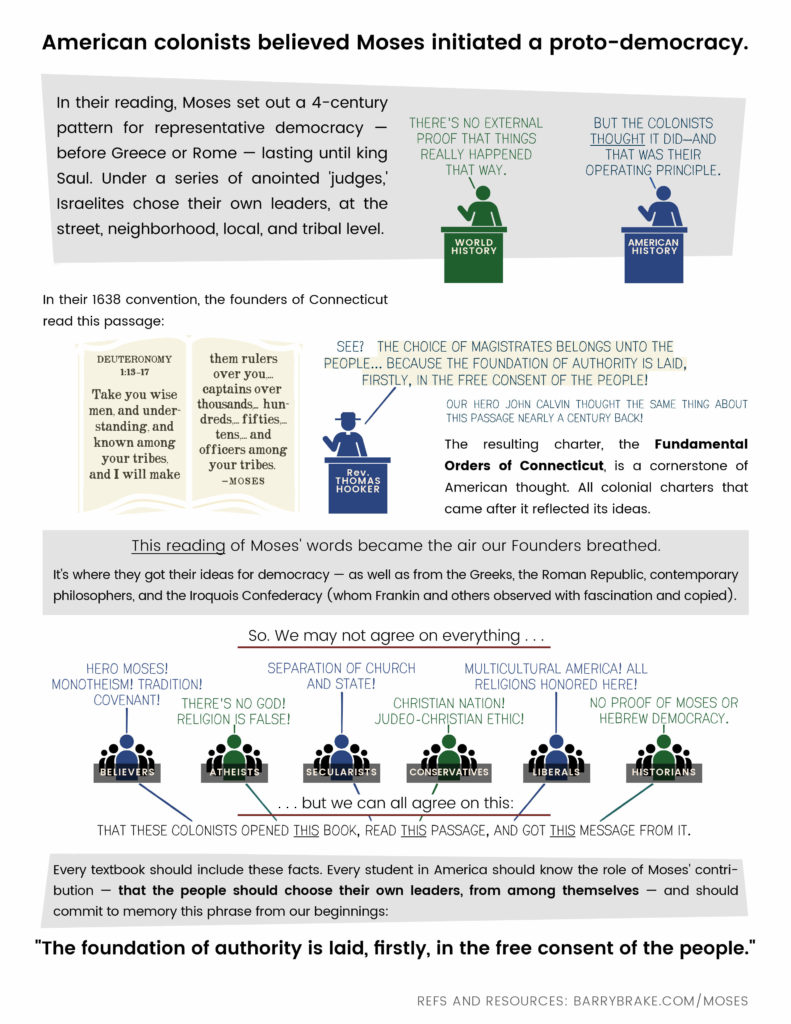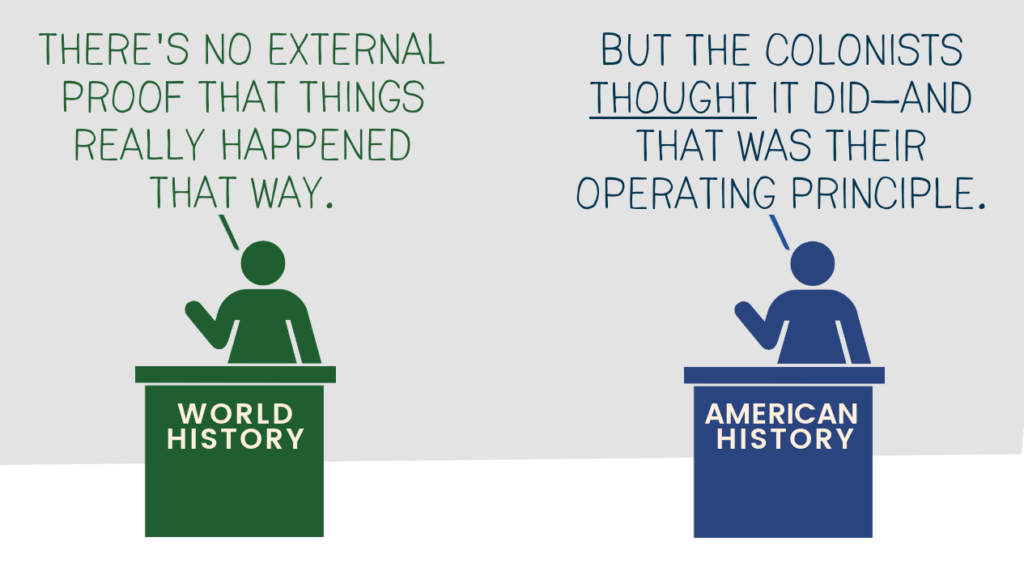Note from SA Charter Moms: We are proud to share this guest post from Barry Brake on an issue of importance to public education.
![[Barry Brake] A Dad Explains to the Texas State Board of Education Why U.S. History Textbooks Should Cite Moses as Inspiration for Representative Democracy | San Antonio Charter Moms](https://sachartermoms.com/wp-content/uploads/2018/11/Barry_Brake_Texas_State_Board_Education.jpg)
I’m sitting in a room in Austin. People are milling around talking to each other, readying for a big meeting. When I say “big,” I mean this big: it will make headlines across the U.S. Texas is considering its textbook standards. Since so many other states piggyback off Texas’s efforts (like a burger place that just builds near McDonald’s instead of doing their own market research), we have an outsized role in American kids’ education. You might have heard that emotions run high about all this. On the docket for today: whether to keep the “streamlined” items out, or put some of them back in—including mentions of Helen Keller, Hillary Clinton, Rosa Parks, Christopher Columbus, lady pilots, Israel and Palestine, Alamo heroes, the Travis letter, and Moses. So, as I said, a big meeting.
I’m looking around the room, trying to size up my audience. I see gray-haired men in American-flag ties, women in hijabs, a blind and deaf girl and her translator, bunches of styrofoam-cup bureaucrats, several young and sharp ready-for-cable lobbyists, and my bleary-eyed wife, who has come up to Austin with me. We’d gotten up at 5:45.
To get up at 5:45 in the morning, I must be motivated. In this case, I was motivated by frustration. The question “Where did America’s Founders get their ideas?” has had several answers in the national conversation recently. Yes, because of Judeo-Christian tradition! No, because of separation of church and state! Yes, because the biblical idea of a covenant contributed to our constitutional structure! (That one’s actually in a proposed textbook.) No, because this is all legend and Moses didn’t even exist! Yes, because our laws are based on the Ten Commandments! No, because the Founders looked to Greece and Rome and Enlightenment values, not Biblical ones! And on and on. But not once—not one teeny tiny time—did I hear anyone give the answer I would have given: that the record shows the colonists were inspired by Moses’s instruction to the people to choose their own leaders, from among themselves. It’s not about the commandments: it’s about self-rule.
With a couple of extra minutes before the meeting, I set my timer and go through my entire presentation one last time. The board sets a three-minute limit on every speaker. As any speaker knows, an hour-long speech doesn’t take much preparation; a short speech takes tons. But three minutes? That means hold the pickles and the lettuce. There’s just not time to include everything you want to say, or build a careful and nuanced argument.
A few days before, though, I’d gotten another message: because of the ambitious agenda and the number of speakers, we’d only get two minutes. Two! That means no mustard, mayonnaise, or bun. Straight to the meat.
This is hard, because the Malcolm Gladwells of the world have conditioned us to introduce ourselves, our selves, before introducing our topic. Generally, that’s great advice. It gives people something to hold on to. Audiences like narrative. But as the day progressed, I heard speaker after speaker make the mistake of setting the stage at length, only to hear the warning bell—thirty seconds left!—before they’d even settled into what they wanted to say.
As I’d prepared and cut and honed, I’d had to do idea triage. What’s the main thing here? What’s the best way to put it forward, so it actually gets through to people? Deuteronomy chapter 1, in a neglected passage, shows Moses telling the people of Israel to choose wise and well-known leaders from their ranks, to take charge over groups of ten, fifty, a hundred, and a thousand, plus tribal officers. This is hundreds of years before the democracy of Athens or the republic of Rome. I’ve got to have that. It’s the meat. Exodus chapter 18, where Jethro gives him the idea to delegate? It’s part of the story, but we don’t need it in two minutes.
I’d felt like I should refute some of the wrong ideas floating around. Our laws aren’t in any way based on the Ten Commandments, and we wouldn’t want them to be. We often fly right in the face of them, starting with the first commandment, which forbids worship of anyone but Jehovah. Just about our proudest go-to is that anyone in America is free to worship in any way they want, or not worship at all. As for the others: graven images? Coveting? Keeping the Sabbath? Nope. The Ten Commandments are important, and my wife and I teach them to our daughters, but they’re not a basis for American law. As for “covenant” and the “Judeo-Christian” bit, those are vague terms that do nothing to educate our kids on the machinery of democracy.
From the other direction, the fact that many folks think of Moses as legend and not history is a tricky one. A great number of people are offended by that idea, and think of the Bible as a sort of history book itself. If I make enemies and close ears, I don’t get my message across. But then again, I do want to acknowledge the fact that we’re talking about history, and not religion class.
I worked and worked to phrase it as carefully as possible so as to keep as many people going as possible. In our tribal times, it’s suicide to start off with, “Hi, I’m your tribe’s enemy!” But I could say something like, “There’s no clay tablet or archeological find that confirms any of this one way or the other. So, non-believers can say ‘I don’t believe that.’ Believers can say ‘I do believe that.’ But the colonists definitely believed it, and the question here is not whether there’s archaeological proof of Moses. It’s ‘where did the colonists get their ideas?'” A nice way to thread the needle, I think.
As for the separation of church and state, I myself am perfectly placed to address it. I’m a traditional Baptist. Our proud history in America is as deeply religious advocates of separation, going back to Roger Williams and beyond. Whenever a church got state power, no matter which church, they’d always oppress the Baptists, so we’ve been (until recently) allergic to church-state conflation. I like to say I’ve seen what the school cafeteria does to spinach. I don’t need them serving up religion. I’ll teach my own kids what we believe. (And the Catholics and Presbyterians and Jews and Muslims and Hindus and atheists all around us can teach their kids.) Meanwhile, it’s perfectly . . . uh, kosher . . . to teach all of our kids what the colonists thought. That’s a matter of history. It does have a place in the classroom.
Two minutes! I decided to do as little refuting as possible. Keep it positive. I took ages to cook and cook the handout we were allowed to provide, so that it was only one page. I took great care to make it as kind as possible to all points of view, but as frank as possible about the facts. I decided to focus on one specific, inarguable example: Connecticut’s 1638 founding, and Thomas Hooker’s direct mention of the Deuteronomy passage as a pattern for representative democracy. It’s black and white history, it’s something new and interesting—and not one major textbook in America makes a single mention of it. Not one.
I intend to change that. With a little effort, we can raise awareness with schoolteachers in our circle of influence, even before any of this hits textbooks. You and I, citizens in a rich and free land, can go directly to the decision-makers and try to persuade them. A living picture of those long-ago ideas!
That’s why I’m sitting here in Austin, wondering if I’ve drunk exactly the right amount of coffee. I want to be awake. (5:45, people.) But I don’t want to be jittery and weird.
With some work, I think I can really make a difference here. We can get rid of the current textbooks’ religious hand-waving and vague pedestaling of Moses, and replace it with firm facts about an exhilarating chapter in human history.
After I’d made my case, a reporter came up to me to confirm the spelling of my name and ask who I was with. With? It took me a moment to realize she expected me to be a spokesperson for some organization, some civic or lobbying group. Nope. I told her I’m just a private citizen. A San Antonio dad with kids in school.
If I had it to say over again, I’d eliminate the “just.”
That conversation came later. Now, it’s time. I get up to the lectern. Every word and gesture memorized, for maximum eye contact. I turn on the green light that’s my timed microphone, take a deep breath, and say, “Let’s talk about Moses.”
Barry Brake is a composer and dad. He lives in San Antonio with his wife and two young children.
Read more:
- “Texas education board votes to restore lessons on Hillary Clinton, Helen Keller,” Will Weissert, USA Today, November 14, 2018
- “Texas education board moves to reinsert Hillary Clinton, Helen Keller into curriculum,” Kathryn Lundstrom, Texas Tribune, November 13, 2018
- “Texas board reverses course, votes to keep Hillary Clinton, Helen Keller in history curriculum,” Lauren McGaughy, Dallas Morning News, November 13, 2018
- “Texas education board keeps Helen Keller, Hillary Clinton in recommended teachings,” Andrea Zelinski, Houston Chronicle, November 13, 2018
- “Texas Hits The Books,” Laura Isensee, NPR, November 21, 2014



